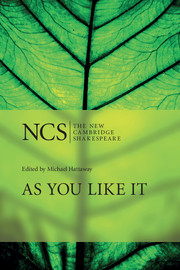Book contents
- Frontmatter
- Contents
- List of Illustrations
- Preface to the Updated Edition
- List of Abbreviations and Conventions
- Introduction
- Note on the Text
- As You Like It
- List of Characters
- The Play
- Textual Analysis
- Appendix 1 An Early Court Performance?
- Appendix 2 Extracts from Shakespeare’s Principal Source, Lodge’s Rosalind
- Appendix 3 The Songs
- Reading list
Introduction
- Frontmatter
- Contents
- List of Illustrations
- Preface to the Updated Edition
- List of Abbreviations and Conventions
- Introduction
- Note on the Text
- As You Like It
- List of Characters
- The Play
- Textual Analysis
- Appendix 1 An Early Court Performance?
- Appendix 2 Extracts from Shakespeare’s Principal Source, Lodge’s Rosalind
- Appendix 3 The Songs
- Reading list
Summary
Journeys
As YouLike It, likemost of Shakespeare's comedies, presents aworld apart: a ‘forest’ to which the principal characters are exiled from court or country estate. The action begins in an orchard and moves to the forest or, as it is sometimes designated in the text, a ‘desert’. It ends with the main characters – with the exception of Jaques, who claims to be heading for a monastic life – returning to court. Almost all of the action takes place within that shadow-land elsewhere, which, given that it is peopled with characters out of pastoral, may not satisfy romantic expectations of wilderness, and in which customary patterns of characterisation and plausibility do not obtain. In this world at the fringe of civilisation there is courtliness, hospitality, and cure, whereas in what we might have expected to be the serenity of Oliver's country estate we witness violence and seeming injustice. For the characters who have escaped from the court, the forest is a place imaginatively familiar and also a metonym for values, particularly those allied with Nature; for those that live there, it has material associations with property and with work. But, somehow, in that slightly anarchic – and very literary – realm of fancy, love blooms: not only, and as we should expect, between heroine and hero as atonement for persecution, but also between familiars (Orlando and Adam), between strangers (Oliver and Celia), between the scornful Phoebe and the poetical Silvius (eventually), and between the cynicalTouchstone and the trusting Audrey (probably). In some ways As You Like It demands to be apprehended as something ‘light, and bright, and sparkling’, a play to breed both delight and laughter. Its romantic assertions are displaced by a fool, enhanced by song, dance, and spectacle, and laced by the subversive irony and eloquence of Rosalind, who alternately revels in and then repudiates the games of love. For Orlando the forest is a place in which he serves an apprenticeship in honour and explores the impulses and idiocies of love-prate.
- Type
- Chapter
- Information
- As You Like It , pp. 1 - 81Publisher: Cambridge University PressPrint publication year: 2009

